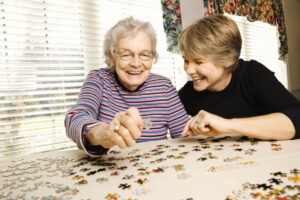How do you know a parent needs more help than you can give? Here’s how to tell when they need assisted living.
Sometimes, it’s easy to see the signs. Maybe your parent experienced a fall or received advice from her physician that it’s time to consider assisted living. But, sometimes the signs are tougher to see.
You may notice your mom forgot to lock her front door once or twice or forgot to turn off the stove. Maybe your dad forgot to take his medicine a few times last month. It can be difficult to identify a shift in a senior’s ability to care for herself or a physical or cognitive decline. So how do you know when these are signs that they need full-time care?
Does My Parent Need Assisted Living?
Generally, adult children visiting their parents observe a few memory lapses or behavioral changes, and they consider these occurrence isolated incidences, says Carmel Dolcine-Joseph, Corporate Director of Clinical Services and Memory Care Programming at Elder Care Alliance, a network of four elder care communities offering assisted living in California.
“Adult children may think it’s just old age, that mom just forgot to eat breakfast that morning or make her bed,” Dolcine-Joseph says. “Incidents of cognitive difficulty or behavioral changes are pieces of a puzzle, painting a bigger picture that adult children usually can’t see.”
Those puzzle pieces—indicating a parent needs care and supervision—can be difficult to assemble on your own.
Some common signs that may suggest your parent could benefit from assisted living can include:
- Needing reminders to take medication
- Noticeable weight loss or gain
- Loss of mobility or increase in falls
- Signs of neglecting household maintenance
- No longer able to perform daily tasks, such as grooming or preparing meals
- Increased isolation
- Loss of interest in hobbies
Many elder care communities offer specialized neighborhoods for residents with dementia. Signs that your parent might need memory care include:
- Exhibiting aggressive behaviors
- Becoming disoriented or getting lost
- Repeating stories or questions
- Problems speaking or struggling to find the right words
- Difficulty planning, concentrating or organizing
- An Alzheimer’s/dementia diagnosis or cognitive decline that requires 24-hour supervision
Need assistance now? Click here to contact us for help or schedule a visit.
If your loved one is recovering from an injury or surgery, skilled nursing communities can provide short- and long-term rehabilitative care. This can be beneficial for seniors who need post-operative strength and conditioning due to minor and routine surgeries, such as joint replacements. Skilled nursing can also assist with recovery from illness, stroke, or a fall.
What Does Assisted Living Do That I Can’t?
Once adult children recognize the signs that their loved one needs long-term care, they sometimes initially want to care for their parent at home—which can be a challenging proposition.
“Oftentimes, the adult child has a full life to live and children to take care of, and being involved in their parent’s day-to-day care can become overwhelming,” Dolcine-Joseph says. “With parents needing that heightened level of professional care and supervision, their children aren’t able to easily juggle life’s responsibilities and their parent’s care.”
If you make the decision that your parent would benefit from round-the-clock, comprehensive care, it’s good to understand all that assisted living communities offer to support your loved one and for you.
For example, before moving into an Elder Care Alliance community, each resident receives a comprehensive physical, cognitive, social, emotional, and spiritual status assessment. This information is used to create a detailed resident care plan, outlining how staff members will provide personalized care for each resident.
“The focus during the initial evaluation process is to obtain a holistic understanding of a resident, in addition to thoroughly reviewing his/her medical history,” Dolcine-Joseph says. “You want to get to know that person in depth: What are their stories and special memories? What are their likes and dislikes? What support services do they need to live an active and fulfilling life?”
The staff also consults with primary care physicians, caregivers, social workers, and family members to get a comprehensive understanding of each resident. Learning about an individual’s needs helps Elder Care Alliance provide the best possible community living experience for seniors—which, over time, can have an overwhelmingly positive effect on their well-being.
“Adult children of Elder Care Alliance residents have said, ‘I never thought my mother would be able to get out of her room, and here she is, the belle of the ball, leading activities,’” Dolcine-Joseph says. “Once adult children see their parents are really being catered to, are medically stable, and are able to socialize again, they thank our staff for helping their parents live an active and engaged life in a safe and supportive environment.”
For more information on how senior living can benefit your loved one, contact Elder Care Alliance or schedule a visit at one of our communities.




















